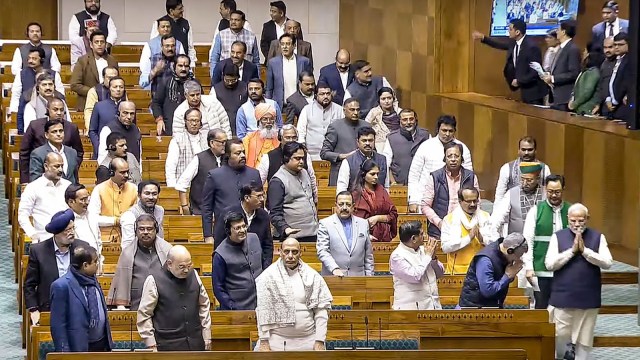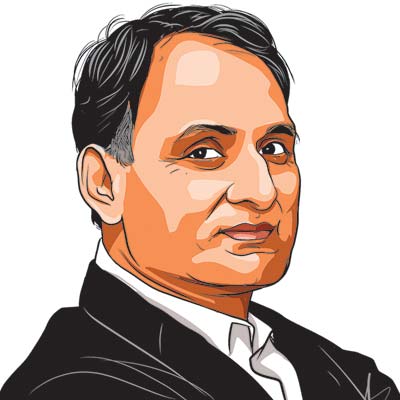

Dec 17, 2024 07:21 IST First published on: Dec 17, 2024 at 07:18 IST
The debate on the Constitution in Parliament not only led to constructive dialogue between the treasury benches and the Opposition but also engaged the people at large. Confusion about the Constitution’s future is not healthy for a democratic polity. The Opposition’s narrative that the government intends to change the basic structure of the Constitution was proved wrong. Members of Congress and the party’s allies criticised the government on governance issues. This was not unexpected. The Prime Minister utilised the opportunity to re-articulate the compatibility between his social philosophy and the Constitution’s letter and spirit. It’s now clear that his welfarist schemes have precipitated a change in the voting pattern among the marginalised sections and enhanced the political autonomy of women voters.
PM Modi is a daring cultural nationalist and a social democrat. This came out in his speech. He linked the Constitution’s progress with the country’s civilisational and cultural aspects, which unfortunately finds no space in the worldview of the Opposition parties. There is no one like K M Munshi, Purushottam Das Tandon, B Pattabhi Sitaramayya, Sampurnand or Ram Manohar Lohia among them. The RSS-BJP enjoys a monopoly in this aspect. A nation with thousands of years of history can not ignore its past. In the Constituent Assembly, Congress leader Lokanath Mishra had warned that “secular state is a slippery phrase, a device to bypass the ancient culture of the land.” That’s exactly what happened during Congress’s rule. This began with an act of deceit on the Constitution itself.
On September 5, 1952, the Speaker of the Provisional Parliament G V Mavalankar, in his farewell speech, announced that “the pages of the Constitution are decorated by scenes of Indian life in ancient period by well-known artist Nandalal Bose.” The sketches included that of Ram, Sita, Krishna, Shiva, Lord Buddha, Mahavira, Shivaji, Guru Govind Singh, Mahatma Gandhi and Subhash Chandra Bose. But when the printed copies were distributed, the sketches had mysteriously disappeared. Rahul Gandhi and his party now share this legacy. The BJP government has to confront allegations of imposing majoritarianism. Samajwadi Party leader Akhilesh Yadav says minorities are being made second-rate citizens. But why should giving ancient culture, heroes and history their due be seen as coercion of minorities? Socialist Lohia used to organise a Ramayan Mela and Rajendra Prasad and more than half a dozen ministers of the Nehru cabinet took part in the reconstruction of the Somnath temple.
The so-called champions of secularism ignored the views of representatives of the minorities — H C Mookerjee, Tajamul Hussain, Begum Aizaz Rasul, Naziruddin Ahmad — because they did not help perpetuate binaries. Mookerjee, a Christian and Vice President of the Constituent Assembly, argued that the recognition of a community as a minority on the basis of religion negates the idea of one nation one people. The RSS-BJP aligns with the idea of such minority leaders.
The shadow of pseudo-secularism hangs over our body politic. That’s why the right to propagate religion as a fundamental right, mentioned in Article 25, remains uncontested. Such rights deter secularisation and unity of the people. This was also the view of several Constituent Assembly members including, M Ananthasayanam Ayyangar, R V Dhulekar and K M Munshi. No one accused them of being majoritarian. However, it’s obvious that secularism was nipped in the bud in India, and in its place came pseudo-secularism. This needs to be corrected. Modi’s spirituality and his respect for culture offer reason for hope.
Modi attacked dynasty-based politics. It is true there are shades of micro dynasties in the BJP too. The party sees it as a necessary evil. However, the Opposition politics moralises it by taking refuge in the people’s mandate. Modi, in contrast, raises his democratic morality by vouching to end it. His message is for the entire body politic, including both fat and thin dynasts. He knows there are people beyond political membership and commitments. Such people play a silent but vital role at all critical junctures.
most read
Modi’s attack on Congress’s poor record on freedom of speech and press is not without historical background. Barely 15 months after the implementation of the Constitution, Nehru brought the First Amendment Bill before the provisional Parliament. This was intended to limit the freedom of expression and press. He could not provide the substantive reasons for such censorship. He couldn’t wait for the formation of the first Parliament by elected representatives. He argued that the Constitution could not be static. This led Syama Prasad Mookerjee to accuse him of treating the Constitution as a “scrap of paper”. Another member Naziruddin Ahmed argued that Nehru went against his own argument. The American constitution’s first amendment, in contrast, enlarged the scope of freedom of expression. Congress can not dismiss the BJP’s role in safeguarding the Constitution during the Emergency.
History offers lessons in times of divisions in politics and society. There are three great lessons which today’s political and intellectual class have not absorbed adequately. Ideas must not be suppressed under the iron law of discipline. Deshbandhu Gupta of the Congress and a member of the Constituent Assembly opposed the First Amendment Bill. Second, differences of ideas should not lead to hatred among members of the political and intellectual classes — this hurts the evolution of parliamentary democracy. Finally, every member of the Constituent Assembly was a thought leader. They provided intellectual grounds to even tolerate extreme views. Similarly, the debate in Parliament offers hope. At the end of the day, Modi counted his political and ideological gains, while the Opposition had to reckon with its intellectual and credibility deficit. False narratives do not give political dividends.
The writer is a former BJP Rajya Sabha MP
Why should you buy our Subscription?
You want to be the smartest in the room.
You want access to our award-winning journalism.
You don’t want to be misled and misinformed.
Choose your subscription package


